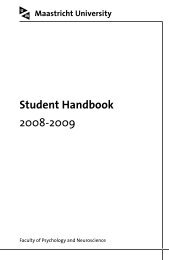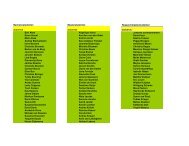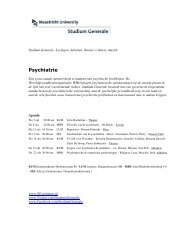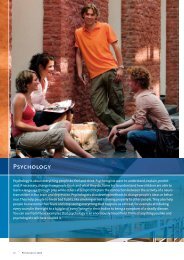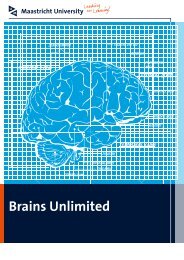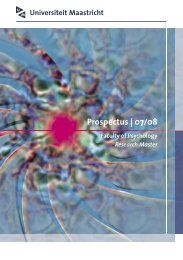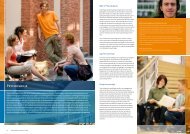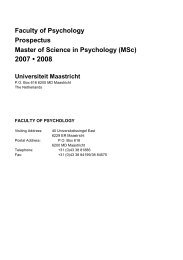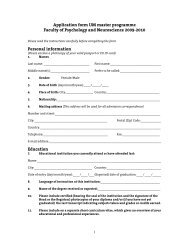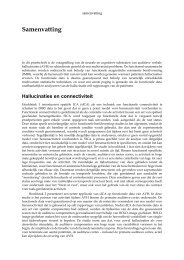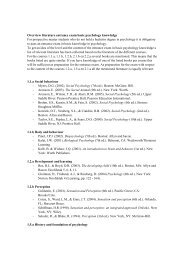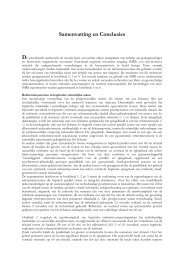Prospectus | 08/09 - Psychology and Neuroscience - Maastricht ...
Prospectus | 08/09 - Psychology and Neuroscience - Maastricht ...
Prospectus | 08/09 - Psychology and Neuroscience - Maastricht ...
Create successful ePaper yourself
Turn your PDF publications into a flip-book with our unique Google optimized e-Paper software.
Chapter 4 - Specialization Neuropsychology<br />
Description of the Course<br />
The goal of this training is to acquire basic skills in major peripheral<br />
psychophysiological measures. The relation between cognitive <strong>and</strong> psychophysiological<br />
variables, such as memory load, mental effort, <strong>and</strong> attention, will be made clear. In<br />
addition, general methodological concepts <strong>and</strong> issues, such as tonic (baseline) activity,<br />
phasic activity, <strong>and</strong> the so-called ‘law of initial value’, will be discussed.<br />
The training consists of four meetings. In the first meeting, an overview will be<br />
presented of the psychophysiological methods that are relevant to neuropsychology.<br />
The second meeting is devoted to major domains in psychophysiology, such as heart<br />
rate (variability), blood pressure, galvanic skin responses, <strong>and</strong> pupillometry (i.e., pupil<br />
dilation). In this meeting, students acquire basic h<strong>and</strong>s-on experience in the laboratory.<br />
The third <strong>and</strong> fourth meetings are practical sessions, in which an existing dataset will<br />
be provided to analyze <strong>and</strong> report on.<br />
81<br />
Instructional Approach<br />
Lecture, demonstrations <strong>and</strong> practical sessions.<br />
Form of Assessment<br />
Short written research report.<br />
| 458NP Neuropsychology in Practice: From Test Results to Report <strong>and</strong> Advice<br />
– 2 credits<br />
Coordinators: Bart Scholtissen, Psychiatry & Neuropsychology (FHML), Phone 38 84100,<br />
12 Dr. Tanslaan, Room 4.E3.007, E-mail: b.scholtissen@np.unimaas.nl;<br />
Renate de Groot, Psychiatry & Neuropsychology (FHML), Phone 38 81038,<br />
12 Dr. Tanslaan, Room 4.E3.007, E-mail: rhm.degroot@np.unimaas.nl;<br />
Rudolf Ponds, Psychiatry & Neuropsychology (FHML, University Hospital <strong>Maastricht</strong>,<br />
Maastro Clinic), 12 Dr. Tanslaan, Room 4.G3.061, Phone 38 76044 ,<br />
E-mail: r.ponds@np.unimaas.nl<br />
Description of the Course<br />
The aim of this skills training is to learn to integrate several aspects of a neuropsychological<br />
examination. This kind of examination can be used both in the clinical setting<br />
as well as in clinical research <strong>and</strong> contains the following aspects: interview, clinical<br />
impression, test results, rating scales, questionnaires, etc. Learning to interpret <strong>and</strong><br />
integrate the different aspects will result in a coherent neuropsychological report <strong>and</strong><br />
conclusion. Tests, theoretical <strong>and</strong> practical knowledge will be presented in the current<br />
skills training in order to achieve the above-mentioned aim. Note that the major focus<br />
of this skills training is not testing a patient or a subject participating in a study, but<br />
interpretation of the acquired data.<br />
The skills training consists of eight meetings. In the first two meetings, an overview<br />
will be presented of the skills needed to form a conclusion about the data acquired



